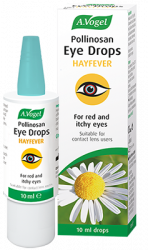Why can hayfever season start early?
 Last week saw the beginning of increasing pollen counts in some parts of the country, but this week things have really stepped up, with many areas experiencing moderate or high pollen counts.
Last week saw the beginning of increasing pollen counts in some parts of the country, but this week things have really stepped up, with many areas experiencing moderate or high pollen counts.
While hayfever is commonly associated with grass pollen, which affects 95% of hayfever sufferers and generally occurs from June onwards, symptoms can also be triggered by tree pollen, which occurs much earlier in the year. A few trees can begin pollinating as early as February, but the biggest offender, Birch, which affects around 25% of hayfever sufferers, begins pollinating from March onwards – and it is Birch pollen that we are seeing in high levels in parts of the country this week.

What areas will be affected?
Generally speaking, the southern end of the country is likely to be affected first as it is warmer weather that triggers this pollination. This week we can see that Bristol, Norwich and nearby cities such as Swindon, Bath, Lowestoft and Bury St Edmunds have high pollen counts, whilst the majority of Wales, the Midlands and Southern England, including London, are experiencing moderate pollen counts.
What’s next?
As the weather warms up we should see increasing levels of Birch pollen creeping north through England and finally into parts of Scotland – Birch is actually the most common native species in Scotland. Plane and Oak trees are also common allergens and their pollen season tends to peak around April, so we may see higher pollen counts of these trees soon.
Then, of course, the main hayfever season starts with grass pollen around about May, peaking in June and July.
What precautions can you take?
The severity of your reaction to tree pollen really dictates the types of precautions you should take – some people may need to avoid going outside altogether, whereas some people will be okay simply avoiding the peak times. Have a read through our tips and try to judge which ones apply to you.
- Birch trees are commonly used decoratively in cities, but can also be found in parks, forests and rural areas, making them tricky to avoid. Instead, look out for large clusters – such as the Birch trees outside the Bankside Tate in London – and make a point of steering clear of these
- Pollen counts are generally highest in the early morning and late at night, so avoid opening the windows during these times to prevent pollen coming inside. You may also want to avoid going outside during these times. On very high pollen days you may wish to avoid going outside altogether
- When going outside, try lining your nose with some coconut oil or lip balm to help catch pollen before it enters your system. Wraparound sunglasses can also prevent pollen from irritating your eyes
- When you come back inside, make sure to take off outer layers in the bathroom or utility room to prevent spreading pollen around your living and sleeping areas
 Wash your hair before going to bed to make sure pollen doesn’t end up all over your pillow
Wash your hair before going to bed to make sure pollen doesn’t end up all over your pillow- Dry your clothes inside rather than on a washing line, especially on high pollen count days
- Start taking your hayfever medication – this could be a prescription medicine, over-the-counter treatment or herbal remedy, such as Pollinosan.
- Check your local pollen count daily – we have local data availalbe for hundreds of locations including London, Manchester, Birmingham, Edinburgh, Cardiff and Belfast.




 Looking for relief of red and itchy eyes due to hayfever?
Looking for relief of red and itchy eyes due to hayfever?

